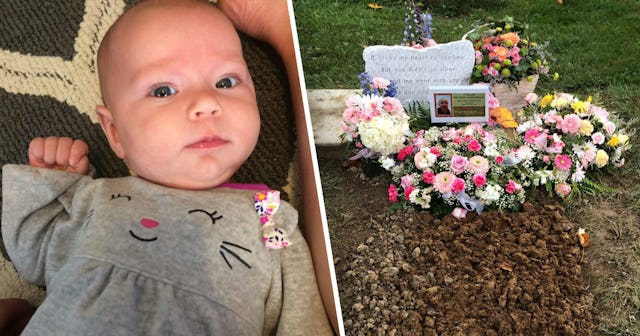My Daughter’s Death Changed My Religious Outlook

Trigger warning: child loss
My entire family grew up in church. We bowed our heads before family dinners, wore our best on Sundays, and I can’t remember a time where my grandma didn’t have her pink, floral Bible sitting on her nightstand.
Christianity was a part of me, and when my daughter died, that was no different. I planned a typical Christian viewing and funeral for her, and it was perfect. It was what I needed and wanted at the moment. I spoke of how much I missed her, how I was hopeful that she was sitting on my grandma’s lap as she played Mozart on the piano, and how I hoped that Jesus would walk her through the parted seas.
The alternative thoughts I had were more practical and more painful: that she was truly gone, in every way, shape, and form, that I would be putting her in the ground soon when she hadn’t even spent 24 hours away from me, that this was the final goodbye, and the roles we played were opposite what they should be. I forced myself to cover up the other invasive thoughts with something better, prettier than what her death was. I needed to imagine her somewhere sunny, happy, and warm. I needed to believe that she was somehow at peace and, ultimately, wasn’t as dead as she was the last time I saw her. I can see now that I used my faith as a blanket for my denial.
Courtesy of Caila Smith
It seems like automatically assuming everyone is of the Christian faith is a right of passage where I come from. Obituaries shared online with captions like “fly high” or “now you’re in the arms of our Lord” are probably the most common ones you’ll see when someone dies around here. It’s supposed to be comforting, not only to whoever is sharing but to those closest to the deceased.
Comments like these and more are no strangers to me, even still. I’m told by others how they imagine my daughter in the afterlife now, how happy she has to be, and that she’s “looking down on me from heaven.” I know they mean well, and I appreciate their willingness to try. But lately, these Bible Belt comments have begun to feel like empty platitudes lacking any real sentimental meaning.
I’ve lost (or maybe found?) what I believe in over the years. I still believe in a higher power, but I don’t have the same undying faith as I once did. I can tell you what I hope happens when we die, what I hope happened to my daughter while being humble enough to admit that I might be wrong.
I feel like many Christians, in their heart of hearts, recognize this too, but they won’t admit it because to do so would feel like they are denying God. Their thoughts aren’t lining up with their feelings. Christians have been conditioned to believe that questioning God’s word is the same as denying his word. People aren’t thinking for themselves — the church and the Word of God are doing their thinking for them.
I used to push out my doubts about Christianity because those thoughts “weren’t from God” but something much more sinister. When I finally took a cold, hard look in the light of day at those doubts, I started to realize that they held some merit. Now, I’ve found myself questioning everything I once believed to be true about Christianity.
My grief has transformed through this time of spiritual change. Whereas I used to find peace thinking about my daughter doing “heavenly” things, these thoughts make me uncomfortable and sad now. Being bold enough to admit that I’m not sure what the afterlife looks like for my daughter or anyone else has been one of the most trying aspects of my grief. Being sensible about my uncertainty is to erase the warm and fuzzy ideas I had about my child’s death and replace them with something much more realistic.
It isn’t easy work. But perhaps the most difficult part is knowing that, even after I’ve said my peace, many Christians will not respect my viewpoint. Instead, it will turn into some sad story about a bereaved mother who lost her faith out of anger for her Lord. But if you know me, you’ll know that that stereotype doesn’t fit me.
Courtesy of Caila Smith
I wish Christians knew that I can carry broken pieces that make me angry without being a broken and angry person. I can be realistic without my views being some form of blasphemy. I can do whatever I need to do to get my mind in the right headspace to grieve this horrific loss. Because that’s the thing, it’s my loss. I get to choose how to deal with it.
It’s taken me years to find what works, and I’ve found that the Christian idea of looking at death does nothing for me. I move forward by remembering my daughter for who she was, and I make no apologies for it.
I hope there is a heaven, and I hope I find my daughter there one day. In the meantime, I won’t allow myself to dwell on the endless possibilities. I choose to be realistic in my grief because imagining doesn’t make her death any easier on me; it prolongs it for me.
Courtesy of Caila Smith
This article was originally published on